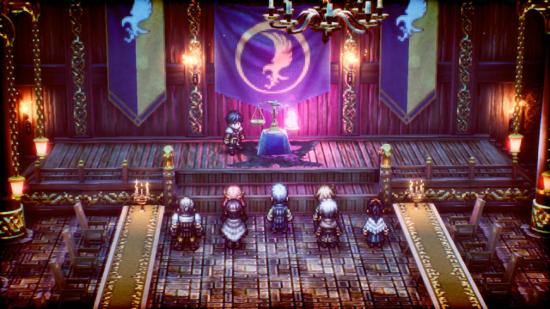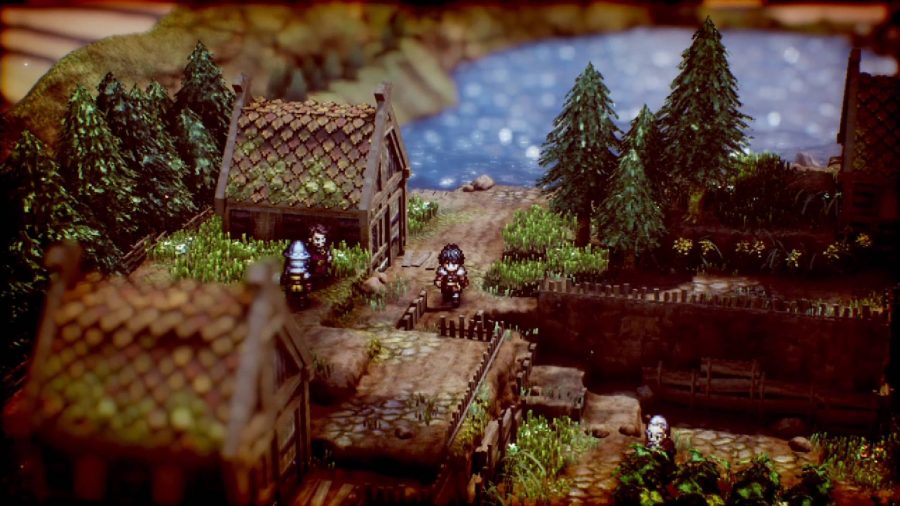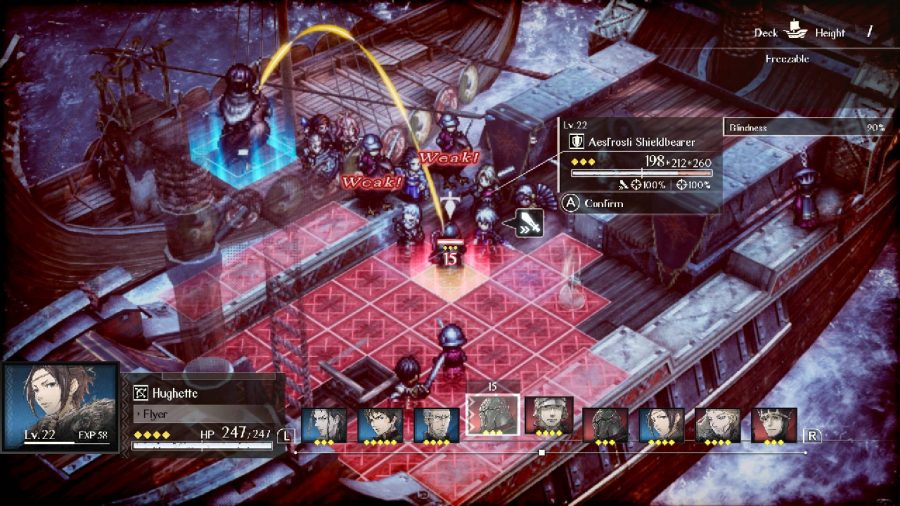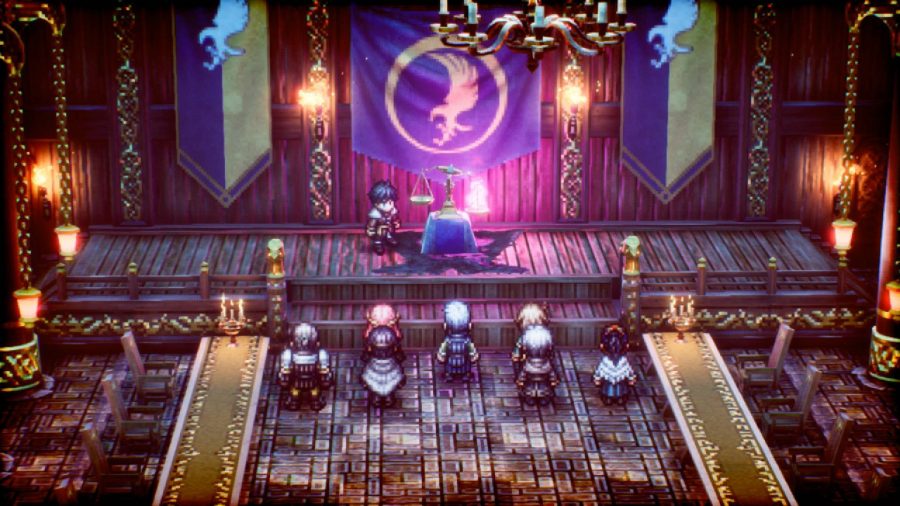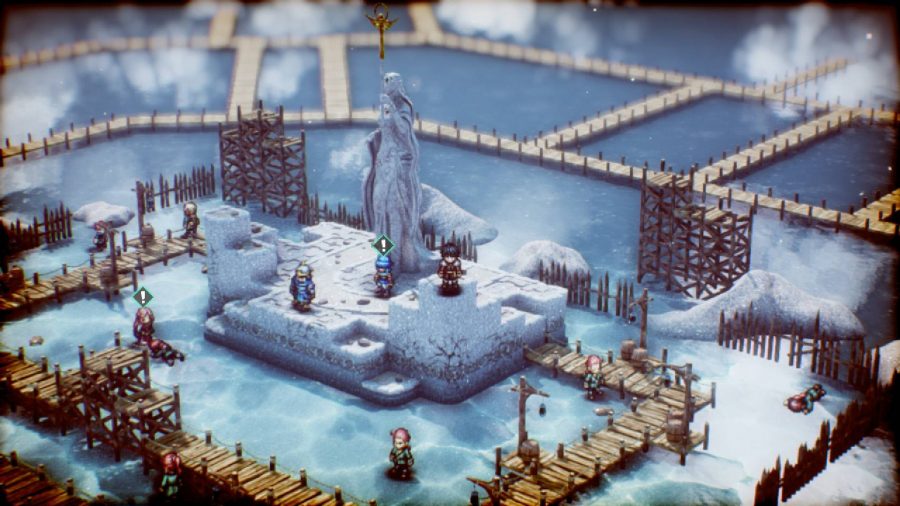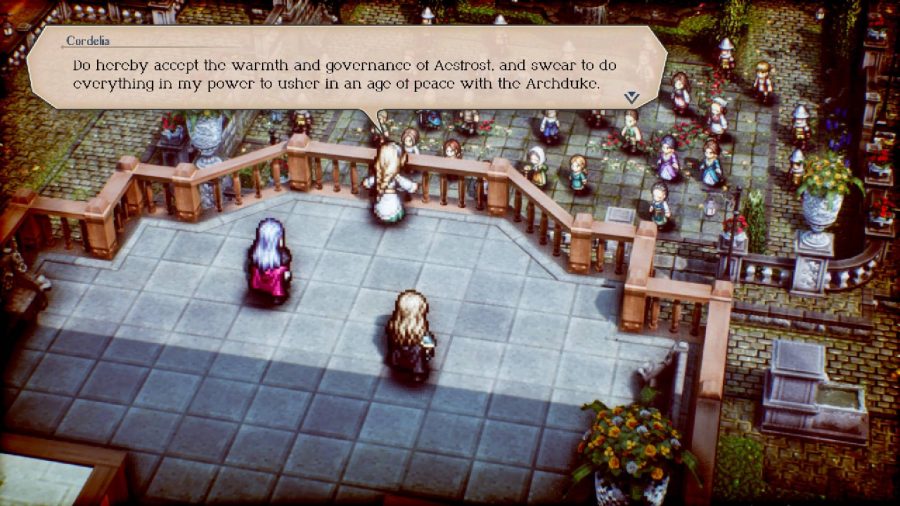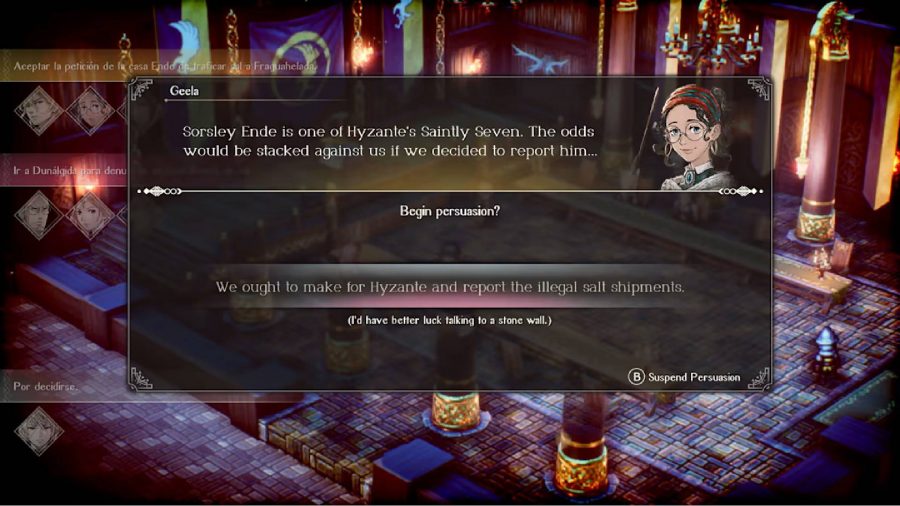There was a moment several hours into Triangle Strategy that will always stick with me. As I led my team members – playing as Serenoa, the lord of House Wolffort – we had to make a decision that could provide victory in battle, but would come at a great human cost. I spoke to my team and tried to persuade them one way, but found that, while both my previous actions and the information I possessed held sway, it wasn’t enough.
The vote didn’t go the way I wanted no matter how much I argued, and I had to live with the choices we made – the choices that my actions lead to. It was a pyrrhic victory that still felt like a gut punch, and I had to wrestle with the sort of person my Serenoa had become. Triangle Strategy is full of these moments, and after completing it and having to sit and ruminate on the fate of the world I explored, I’m already aching to go back through again and play the story a different way, just to see what I can change.
So, while it might be very plainly named, what exactly is Triangle Strategy? First of all, this is not Octopath Traveller. I adored Square Enix’s previous HD-2D title, but I agree with the criticism that having eight different stories somewhat diluted the plot, and left the individual tales feeling a touch disparate and inconsequential. Yes, I know they come together at the end, but what about the first 100 hours?
It seems the developers have taken this to heart though, as Triangle Strategy is almost the antithesis to that style of storytelling. Instead, it hones in on one sprawling story of political divides between three nations, where every decision and each moment holds critical meaning to the world at large. Triangle Strategy is a vast and epic tale of the corruption of power and a fight over resources, with meaningful personal and political strife tearing the world apart. There’s a fascinating story here, and Square Enix tells it very well.
At its core, Triangle Strategy is the tale of three nations, and the monarchies, politicians, and fragile political allegiances that hold them together. The realm known as Norzelia is home to the three nations of Glenbrook, Aesfrost, and Hyzante. You step into the shoes of Serenoa, a young man who is the heir to House Wolffort, and must eventually represent the proud people of Glenbrook, and try to broker peace and uphold the treaty that keeps each land together.
After a terrible war over resources centuries ago, each country resolved to work together to ensure that everyone could live prosperously, sharing the wealth of each nation and its resources amicably. However, tensions still exist behind the scenes. Serenoa’s story is deeply entwined with the building unease between the nations, and the decisions you make and the allegiances you forge have far-reaching consequences.
One of the core mechanics at play here is Serenoa’s Conviction, which is informed by the dialogue options you choose at certain points, among other gameplay elements. The way you battle, the number of people you talk to, and more all adds up to strengthen the type of person your Serenoa becomes, and this affects every aspect of the story going forward.
NPCs ask you questions pertaining to how you intend to help the people of Norzelia and your approach to resolving political disputes, while both your teammates and the nobles you meet give you actionable options, where you must decide how you’ll try to lead. It’s a good mixture of both overt and covert elements that all work together to strengthen your convictions, all of which are integral to swaying the decisions of your party and steering your story as you explore Norzelia.
Later in the game, you must make much heavier decisions, and every member of your party gets a vote. Here’s where your conviction is essential, as well as the information you gather along the way. If you’ve explored properly and spoken to many characters, the knowledge you’ve gained can inform your arguments towards one particular outcome.
Strengthened by your conviction, this is a really fascinating approach to the story. Once I got my head around these almost detective-like elements, it made every corner of this world feel essential to my understanding of the tensions and ties between each nation. Plus, the potential for subsequent playthroughs as you explore the different paths and outcomes is huge.
Exploring the towns opens up quest-like branches, where evidence found in one corner can be given to somebody else hidden away. I often found myself saving before these moments and resetting when the outcome didn’t seem quite right, before diving back in and properly uncovering the dialogue and evidence I needed to unearth the truth.
Given the focus the game puts on replayability, I will say I would’ve appreciated easier ways to simply replay chapters or missions, but it still works. Meanwhile, these moments exploring towns, uncovering the truth of the land, and revealing the hidden secrets of its inhabitants are fascinating, and only added to the emotional weight of every battle.
This does come at the cost of action though – anyone expecting the non-stop combat found in Octopath is going to be disappointed. Battles do happen occasionally, but they’re infrequent. Instead, the starting moments work hard to truly establish the importance of this world and the characters within it. Later in the game, as things escalate, battles become a more frequent occurrence, also increasing in intricacy, as new elements are continually added to keep things interesting.
You can also choose to engage in training battles in your encampment, but, overall, there’s less fighting here than in other titles like Fire Emblem: Three Houses, which has a plethora of side missions to explore. Every battle in Triangle Strategy is a part of the main story, and you’ll be hearing dialogue just as much as you’ll be swinging swords.
Speaking of battles, if you’ve watched a trailer, then you know Triangle Strategy apes tactical RPGs like Final Fantasy Tactics, Fire Emblem, or Tactics Ogre. You control many characters at once, moving your pieces strategically to envelope your opponents, and using the landscape, as well as your weapons, to your advantage. Serenoa and his forces all have individual abilities, so choosing which characters to deploy is heavily dependent on your playstyle and the weakness of your opponents.
Split between soldiers, magic users, animal tamers, and more, there are a lot of options and many additional friends to make on your journey. Then, as each character levels up, they learn new abilities, and get the chance to later take on new jobs, expanding their abilities and stats even further. You also manage your resources to increase weapon proficiency, though I did find that the drop rate on items didn’t feel very generous. Items can also be bought from a merchant, and exploring towns thoroughly does dish out rewards, but I never felt like I had enough to properly arm my team the way I wanted.
Later in the game, you can gain new teammates as well, with the specific roster of available characters changing depending on your convictions and actions. These later additions, along with their unique abilities, all bring something fresh and interesting to the battles, and some became immediate favourites of mine. It’s really refreshing to still be experimenting with your team so late in the game, and I’m excited to uncover the characters I’ve missed on subsequent playthroughs.
Combat is further enhanced by your ability to gain an advantage by attacking from higher ground, perform a backstab, or surround your opponents and attacking from each side, which allows your friends to perform a secondary attack from the opposite side. Successfully using advanced techniques also awards you Kudos, a resource you can only earn through battle, which is needed to buy certain items. Triangle Strategy has an absolutely stellar battling system, and the fact it’s also incentivising smart tactics like this is just the icing on the cake.
Your opponents are ruthless, and more than happy to surround you and use these advanced techniques against you. The difficulty options here really change things up, and while you can have a pretty breezy time on easy mode, I recommend at least attempting it on normal. This really pushes you to think about your units and their individual skills, as well as the advantages and secrets that each level holds.
The variety of environments is also really nice, as the different corners of the world offer some gorgeous vistas, and you uncover some really interesting ways to interact with levels later on. For example, one particular battle in a mining cave is very satisfying, and features some really fun elements that are simply never shown again. There’s a lot of confidence in the variety of battles here, and I personally think it pays off.
If that all sounds a bit overwhelming, don’t worry. The developer seems to understand, as they’ve included some nice ways to ease you in. First, at any moment of calm, you can choose to look over your notes, any information you’ve found by talking to villagers, and a summary of the story so far. I really appreciated this, as even though I was really intrigued while learning about this world, it’s easy to miss the more intricate details amongst the exposition-heavy scenes. You can also buy extra information from merchants, so it’s up to you exactly how much you want to invest in this world.
Because you’re constantly moving with the story as well, there aren’t any moments to really relax or explore vendors and such. Instead, you have the ability to stop at your own encampment when you like. As you advance, this encampment gains different merchants, new characters, and many new ways to spend your time.
You can take on training battles to hone your style, spend your kudos on new equipment to advance your stats, or simply go over the information you’ve gained so far. Again, I was really grateful for the opportunity to take stock between battles and go over my party and my plans. Once the story starts moving, it really kicks off, so having the option to take a moment to recollect at your own camp is a lovely change of pace when you need it.
Of course, how invested you are in this world and its story is heavily dependent on how well you gel with its presentation. Personally, I love the HD-2D style, and I think it’s improved from Octopath Traveller here with a greater focus on 3D environments, a fully controllable camera, and almost voxel-like 3D objects hidden amongst the scenery. With clever use of depth-of-field as well, I was constantly taking screenshots – especially in the more scenic and dramatic moments.
Similarly, the music here really works for me, delivering a grandiose and fittingly exhilarating soundtrack, which brings a perfect sense of drama with a gorgeous melancholic tinge that really fits the story. Sadly, one element I wasn’t entirely keen on (other than the awful name) was the voice acting. While the main cast of Serenoa, Frederica, and Roland, all do fairly well with a very earnest script, other characters quickly dip in quality, and a few genuinely irked me, with lifeless delivery that took me out of scenes.
I look back at my 50 hours with Triangle Strategy and I am wildly impressed by the dense, fascinating, and constantly shifting political thriller that has been placed over the bones of a fantastic strategy game. This could be the nearest thing we have to a good Game of Thrones video game, and players may be surprised by the seriousness of the story’s themes and the heavy cost of some of your decisions.
The great exploration of your morals through Serenoa, the scales of conviction, and the game’s commitment to consequences and reactions make this whole world tick, contributing to the ever-shifting dynamics that ripple through the world and making each of the battles feel so essential. There could well be a little too much exposition for some, and I don’t think the presentation will be for everyone, but I adored my time in Norzelia and the battles that decided the fate of my party.
Triangle Strategy review
An expansive, intricate tale with far-reaching consequences, Triangle Strategy tests your convictions just as much as your tactical skill, with Norzelia itself an essential character in this tale of loss, leadership, and the divides in civilisation. A sublime tactical game with a gut-wrenching story of political and personal strife, I already can’t wait to play it again.
